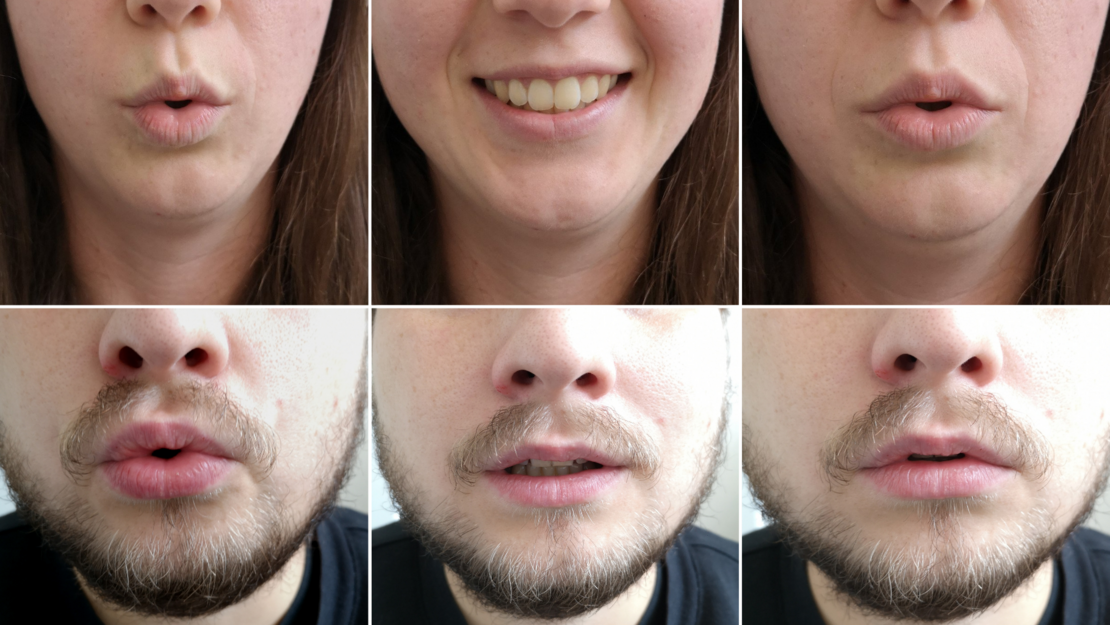This page contains automatically translated content.
Experiment shows how vowels convey emotions
 Image: University of Kassel.
Image: University of Kassel.Words containing the vowel "i" are perceived as more appropriate for describing positively connoted objects than words containing the vowel "o". This much is known from a precursor study also conducted at the University of Kassel. However, Dr. Anita Körner and Prof. Ralf Rummer (Department of General Psychology) were able to demonstrate in a series of experiments, which have now been documented in the renowned Journal of Experimental Psychology: General, that the articulation and not the pitch of a vowel is decisive for the emotional evaluation of speech. When the sound "i" is articulated, facial muscles are contracted that are also responsible for pulling up the corners of the mouth when smiling. Photographers, for example, use this when asked to say "cheese." The "o", on the other hand, stresses the counterparts of these muscles and thus prevents the smile.
The researchers tested the valence of the vowels "i" and "o" and additionally examined the vowel "ü". The "ü" has interesting properties for clarifying the phenomenon: The tension of facial muscles when saying "ü" and "o" are similar - both with rounded lips, which prevents smiling. Thus, if the effect on is due to articulatory mechanisms, the vowel "ü" would have to be evaluated negatively in a similar way as "o". In terms of pitch, however, the "ü" is similar to the "i". If one follows the theory that higher tones arouse more positive emotions, words with "ü" would be associated with similarly positive feelings as "i".
In the Kassel study, German-speaking subjects assessed the possible meaning of pseudo-words containing either "i," "o," or "ü." First, they were asked to imagine that the words were from a foreign language, and they were asked to assign their possible meaning to rather positive or rather negative things. The result: words with "i" were more often assigned to positive things than words with "o" and words with "ü". The second experiment took a more subtle approach. When assigning made-up names, subjects more often assigned people with positive facial expressions to pseudo-names with the vowel "i" than to names with the vowels "o" or "ü." Even when the faces differed in terms of attractiveness - rather than emotional expression - the pseudo-names with "i" were significantly more often assigned to the more positive faces. In the final experiment, the pseudowords were spoken to the subjects, yielding the same result as written presentation. Thus, all results provide confirmation that the valence of vowels is significantly influenced by facial expression during speech and not by pitch.
"In the course of individual and language-historical development, these different sounds have therefore apparently become linked to positive or negative emotions," explains Prof. Rummer. In a study from 2019, he was already able to show that the emotional properties of an object have an influence on the invention of new words. For positive things, new words containing the vowel "i" are invented strikingly often. New names for negative things, on the other hand, contain the vowel "o" more often. Traces of this principle can still be found in the German vocabulary today. Researchers have also been able to prove the articulation theory for vowels in other languages. Rummer suspects that the same mechanism underlies other languages as well.
Dr. Ralf Rummer has been a professor of general psychology at the University of Kassel since March 2018. His research focuses on cognitive psychology, particularly in the areas of language, memory, and instructional psychology. Dr. Körner has been a Research Associate in the Department of General Psychology since October 2018 and conducts research particularly in the areas of language and morality.
Publication:
Körner, A., & Rummer, R. (2021). Articulation contributes to valence sound symbolism.Journal of Experimental Psychology: General. DOI: 10.1037/xge0001124
Contact:
Dr. Anita Körner
University of Kassel
Department of General Psychology
Tel.: 0561 804-3582
E-mail: anita.koerner[at]uni-kassel[dot]de
Prof. Dr. Ralf Rummer
University of Kassel
Department of General Psychology
Tel.: 0561 804- 3592
E-mail: rummer[at]uni-kassel[dot]de
Press contact:
Sebastian Mense
University of Kassel
Communications, Press and Public Relations
Tel.: +49 561 804-1961
E-mail: presse[at]uni-kassel[dot]de
www.uni-kassel.de